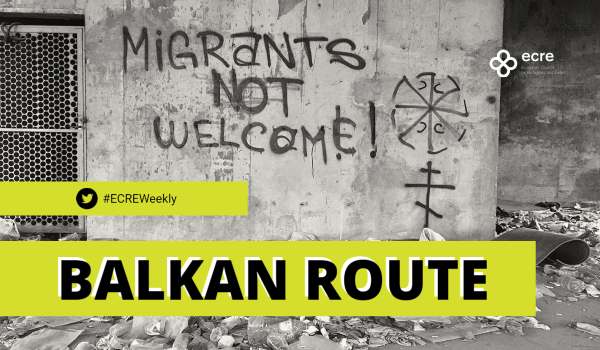A new report by Save the Children reveals the multiple forms of violence child refugees experience while attempting to reach Western Europe through the Balkans. Hungarian police have introduced a new tactic to ‘Christianise’ refugees by shaving their heads in the shape of a cross amid increasing violence against people on the move and deepening exclusion of Roma refugees from Ukraine.
Save the Children recently published a report which is an outcome of in-depth research based on interviews with 48 children aged between 13 and 19 years old that looks into “the level and types of violence that children experience while attempting to reach Western Europe via the Balkans route, the circumstances of that violence, and the policies and practices that exist to support children. The report also provides governments, NGOs and other stakeholders with recommendations to strengthen the protection and support available to these children”. The research revealed that children experience multiple traumatic experiences on the Balkan Route to Europe at every part of the journey including forced detention, fear of separation and deprivation of basic needs, physical and emotional abuse and economic exploitation. The report further revealed that children on the move have limited trust in authorities and even see officials as a threat. Instead, they see families, peers and locals are potential sources of help. Furthermore, the research sadly highlights that the coping mechanism of violated children is the normalisation of the violent trauma they went through.
The report comes out amid reports of an increase in violence and abuse against people trying to enter Serbia from Hungary. According to Klikativ – Centre for Social Policy Development, the organisation has seen a lot over the years but has recently experienced a new level of brutality from Hungarian authorities. Hungary has started using a new tactic to ‘Christianise’ refugees by shaving their heads in the shape of a cross. The Guardian as well as Border Violence Monitoring Network reported in May 2020 about this new tactic implemented by Croatian police in the pushbacks practices by using spray paint to make the shape of a cross on the heads of asylum seekers. On 5 September, NGO Klikaktiv shared testimonies of refugees and asylum seekers from Morocco who experienced physical violence as well as had their heads shaved by Hungarian police. On 12 September, NGO NoName Kitchen published a video footage documenting how Hungarian police frightening a child who got separated from his family. The child is on one side of the border while his family is on the other demanding the police return him. “The marks of violence on people’s bodies are still common in the borders of European countries”, NoNameKitchen stated. On the same day, ECRE member Asylum Protection Center reported about a harsh situation for hundreds of people on the move sleeping rough without access to a doctor, food and beds outside the Subotica reception camp in Serbia.
Meanwhile, Roma refugees from Ukraine continue to feel a deepening insecurity and exclusion in Hungary “since Orbán’s second spell as prime minister. A director of a charity working for Roma inclusion “felt that Orbán’s strategy to address the segregation of Roma was to downplay the problem as much as possible by marginalising Roma’s engagement in public life, relegating them to the fringes of society”. These worrying developments happen amid ongoing critiques of Hungary’s violation of the rule of law and calls from NGOs including ECRE member Hungarian Helsinki Committee (HHC) for the European Commission to tackle corruption and protect the EU budget. According to HHC: “The ongoing negotiations between the Government of Hungary and the European Commission regarding the conditions for Hungary’s access to the EU’s Recovery and Resilience Facility as well as the Conditionality Regulation, triggered by the European Commission in April 2022, provide an exceptional momentum to be seized to recover certain rule of law safeguards and build institutional resilience against further backsliding in Hungary”.
For further information:
- ECRE, Balkan Route: Systematic Pushbacks Continue Across the Balkans, Shortcomings in Croatia’s Monitoring Mechanism, Hungary Applies Double Standards in Approach to Arrivals, July 2022
- ECRE, Balkan Route: Irregular Arrivals Increase Says Frontex, Pushbacks Continues Says UN Special Rapporteur, Hungary Exposed Family to Degrading and Inhumane Treatment Says ECtHR, June 2022
This article appeared in the ECRE Weekly Bulletin. You can subscribe to the Weekly Bulletin here.

